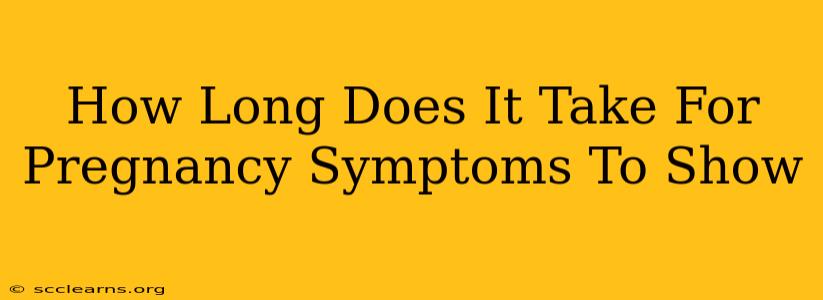Congratulations on starting your pregnancy journey! One of the first things many expectant parents wonder about is when they can expect to start experiencing pregnancy symptoms. The truth is, it varies greatly from woman to woman. There's no one-size-fits-all answer, but let's explore the timeline and what you might expect.
Understanding the Early Stages
Conception typically happens within a few days of ovulation. However, your body doesn't immediately start producing pregnancy hormones in detectable levels. This means that you won't feel anything right away. The earliest symptoms often appear around the time you'd expect your period, which is about two to three weeks after conception.
When to Take a Pregnancy Test
Before we dive into symptoms, it's important to understand testing. Home pregnancy tests detect the hormone human chorionic gonadotropin (hCG) in your urine. hCG levels increase rapidly after implantation, which usually happens around 6 to 12 days after conception. Therefore, taking a pregnancy test too early might result in a false negative. Waiting until at least a week after a missed period is generally recommended for the most accurate results.
Common Early Pregnancy Symptoms (and When They Appear)
Many women experience a range of symptoms, some more noticeable than others. The timing and intensity of these symptoms vary widely. Here's a breakdown:
Week 2-4 (After Conception):
- Missed Period: This is the most common and often the first sign.
- Implantation Bleeding (Spotting): Some women experience light bleeding or spotting around the time of implantation. This is usually different from a normal menstrual period.
- Breast Changes: Tenderness, swelling, or tingling in the breasts can begin early.
- Fatigue: Feeling unusually tired is a frequent early symptom.
- Nausea: Though often associated with morning sickness, nausea can begin early on. However, many women don't experience morning sickness at all.
Week 4-6 (After Conception):
- Morning Sickness: The infamous morning sickness (nausea and vomiting) often intensifies around this time, but remember it's not universal.
- Frequent Urination: Increased urination is a common symptom due to hormonal changes.
- Food Aversions: You might suddenly find yourself disliking certain foods.
- Mood Swings: Hormonal fluctuations can lead to mood changes.
Week 6-8 (After Conception):
- Constipation: Hormonal changes can slow down digestion.
- Heartburn: Increased progesterone levels can relax the esophageal sphincter, leading to heartburn.
- Headaches: Hormonal shifts can contribute to headaches.
Individual Variations
It's crucial to remember that every pregnancy is unique. Some women experience very few or no noticeable symptoms in early pregnancy, while others have several pronounced symptoms. Your lifestyle, health, and previous pregnancies can all affect the timing and intensity of symptoms. Even if you don't experience any symptoms, it doesn't necessarily mean something is wrong.
When to See a Doctor
While many symptoms are normal, it's important to consult your doctor if you experience:
- Severe abdominal pain
- Heavy bleeding
- Fever
- Dizziness or fainting
Regular prenatal care is crucial for a healthy pregnancy. Schedule your first appointment as soon as you suspect you might be pregnant.
Conclusion: Patience and Monitoring are Key
The timeline for pregnancy symptoms varies. While some women feel symptoms early on, others may not experience noticeable changes until several weeks into the pregnancy. Regular check-ups with your doctor and keeping a close watch on your body will help ensure a healthy and happy pregnancy. Remember, a missed period coupled with a positive pregnancy test is the best confirmation. Don't hesitate to reach out to your healthcare provider with any concerns you may have.

